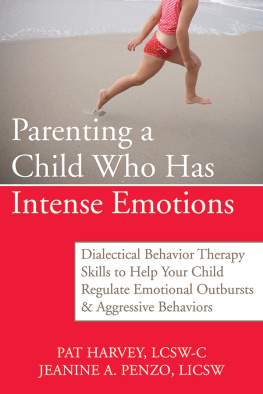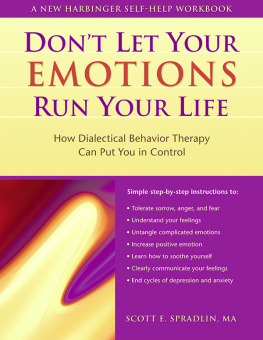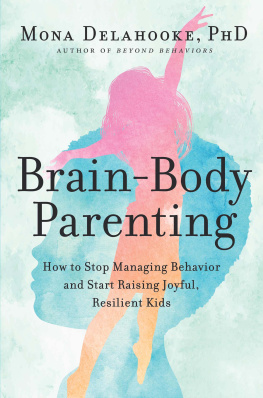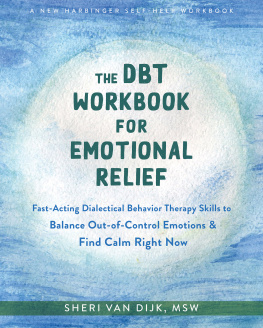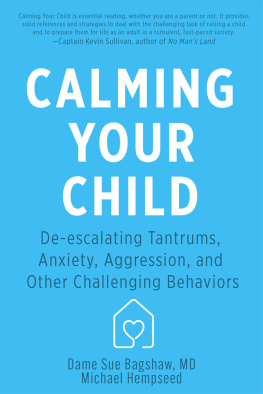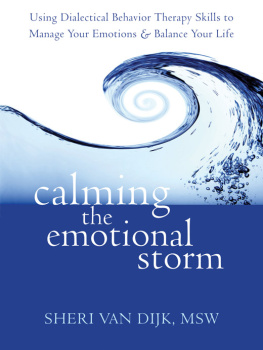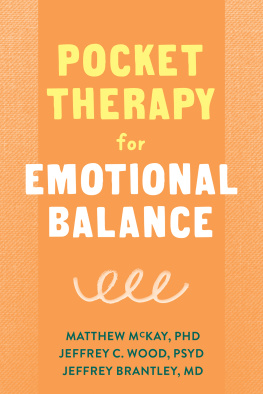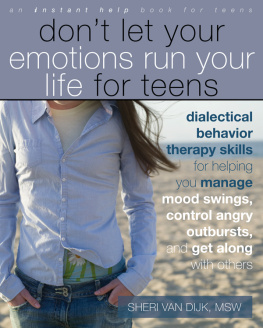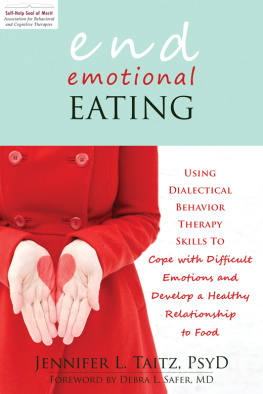Acknowledgments
This book is the culmination of a long journey. I started my social work career as I was just stepping out of adolescence, and as my career advanced I got married, had children, and continued to learn and grow in both my personal and my professional life. As a clinician who always focused on families, it was natural that when I was introduced to DBT (dialectical behavior therapy) at the Bridge of Central Massachusetts I would find a way to use it to benefit parents. This book is the result of all that Ive learned along the way.
I want to thank my earliest teachers of cognitive behavioral techniques and much more, Paul Rosen and Larry Peterson. Your lessons are included in many ways. I also want to thank Steve Murphy at the Bridge, the originator of the term the story of emotion. Steve hired me as a division director and gave me the opportunity to learn, practice, and understand DBT and was the first one to suggest I write a book about parents and DBT. I want to thank Christy (Clark) Matta, who was my first teacher in all things DBT and to whom I owe a tremendous token of gratitude. It was while at the Bridge that I met Jeanine, who provided the inspiration for this book and who is always available to remind me what skills help me the most. I am grateful for her trust and her friendship.
When I moved from Massachusetts to Maryland, I was lucky to be introduced to parents and professionals who were interested in learning about DBT. I am most grateful to Diane Sterenbuch, who led me to the National Alliance on Mental Illness (NAMI) and whose shared interest in borderline personality disorder and dialectical behavior therapy opened many doors for me. I want to acknowledge all the parents I have worked with in Maryland who have taught me so much. Of these, I am most grateful to Gina Shawl, who, as I developed this book, showed me that effective parenting using DBT skills could help very young children manage intense emotions.
Along my journey, I was often guided by Bob Ciottone, psychologist extraordinaire. Bob taught me that change brings opportunities, and his belief in me enabled me to take advantage of many new possibilities. My family of friends in Massachusetts has been a major support throughout, and their cheerleading of this project often kept me going. I am so grateful to have you all in my life. And to the most important people in my life, my children and my husband, I send a very special thank-you for your love and for making everything in my life worthwhile. To Jennifer and Sarah, thank you for letting me practice DBT skills as I parented you and for letting me share our stories as examples for others. I am so proud of the adults you have grown up to be. And Im grateful to my husband, Brad, whose strength and love made the entire journey possible. Thank you for helping me become the person that I am. Thank you all.
Pat Harvey
I was first introduced to DBT skills in 2003, when my daughter with emotion dysregulation moved to a DBT group home for young adults. There, my husband and I participated in the DBT skills group for parents. At that time, I had no idea what an impact the lessons I learned there would have on my life. Pat Harvey was the gifted teacher who shared with us the new skills and strategies that would help us parent our daughter more effectively and allow us to begin looking toward the future with renewed hope. As I later began to teach DBT skills to other parents, patients, and families, Pat was and still remains my mentor. Im grateful to her for all that she has taught me personally and professionally. More importantly, I am thankful for her friendship and inspiration.
I want to express my appreciation to my daughters first treatment team: Jeannie Marcus, MD; Renee Brant, MD; and Roberta Sacks, Ed.D. They showed us unwavering support and encouragement as my husband and I raised our three children while struggling to negotiate the health care system of the 1990s in search of answers and effective treatment options for our oldest daughter. In addition, the personal and professional support I continue to receive from Revan Miles, LICSW, is invaluable as I continue to strive to move forward and balance it all.
The Manville Moms, Donna Burke, Eileen DEntremont, Deb Chamberlain, and Betty Needham, will always hold a special place in my heart. When our children moved on and we no longer attended our formal weekly support group, our personal support network kept me going when life seemed to spin out of control.
Last but certainly not least: without the love of my family, this project would not have been possible for me. I am very grateful to my husband, Mike, and to my children, Danielle, Katharine, and Michael, for your patience and support. Your help has enabled me to coauthor this book. I also want you all to know how proud I am of your commitment and impassioned involvement in mental health advocacy and educationsomething that has become a family endeavor.
This book for parents is the fulfillment of a goal I have had for several years: sharing with parents living in similar circumstances the valuable lessons I have learned about parenting a child with intense emotions. The support I received from all those mentioned above has allowed me to fulfill my dream. Thank you.
Jeanine Penzo
We would both like to thank all the friends and colleagues who read this book along the way and provided ongoing support and advice. A special thank-you to Emily Novick, Rowena Abadi, Gina Shawl, Jill Aubry, Terry Landon, and Revan Miles. And a very special thank-you to Dr. Murray Claytor and Dr. Robert Ciottone, who read the whole manuscript and provided us with invaluable feedback and ideas. We couldnt have done this without all of your help.
We would also like to thank the folks at New Harbinger for giving us the opportunity to write this book. We are grateful to Tesilya Hanauer for believing in this project and for giving two unknown authors the chance to publish this book. We also appreciate all the invaluable editorial guidance we received from Jess Beebe and everyone else at New Harbinger who worked on this project. And we would like to thank our editor, Carole Honeychurch, for working with us collaboratively to bring additional clarity to our message.
PH and JP
Appendix. Resources for Parents
informational Web Resources
Behavioral Tech, LLC
This is the official DBT website, created by Marsha Linehan, Ph.D. Here you will find general information about DBT, a directory to help you find a therapist who uses DBT, listings and registrations for conferences, and resources such as books and videos.
www.behavioraltech.com
BPChildren
This website provides information about bipolar disorder, a newsletter, and resources for parents that include mood charts, posters, books, and magnets. It has information for children, teens, and parents and also includes interactive games designed especially for children.
www.bpchildren.org
National Alliance on Mental Illness
NAMI is often the first stop for parents who think their child has an emotional problem. They provide parent-led information and support groups (including a new program for parents of children, called NAMI Basics), usually free of charge. The organization provides a program to help parents and schools work together more effectively and has a Child and Adolescent Action Center with resources specifically for parents and children. The website provides resources and information about serious emotional disturbance, mental illness, and mental health public policy and legislation. You will also find information about ways to reach your state or local NAMI affiliate.
www.nami.org
National Education Alliance for Borderline Personality Disorder (NEA-BPD)

